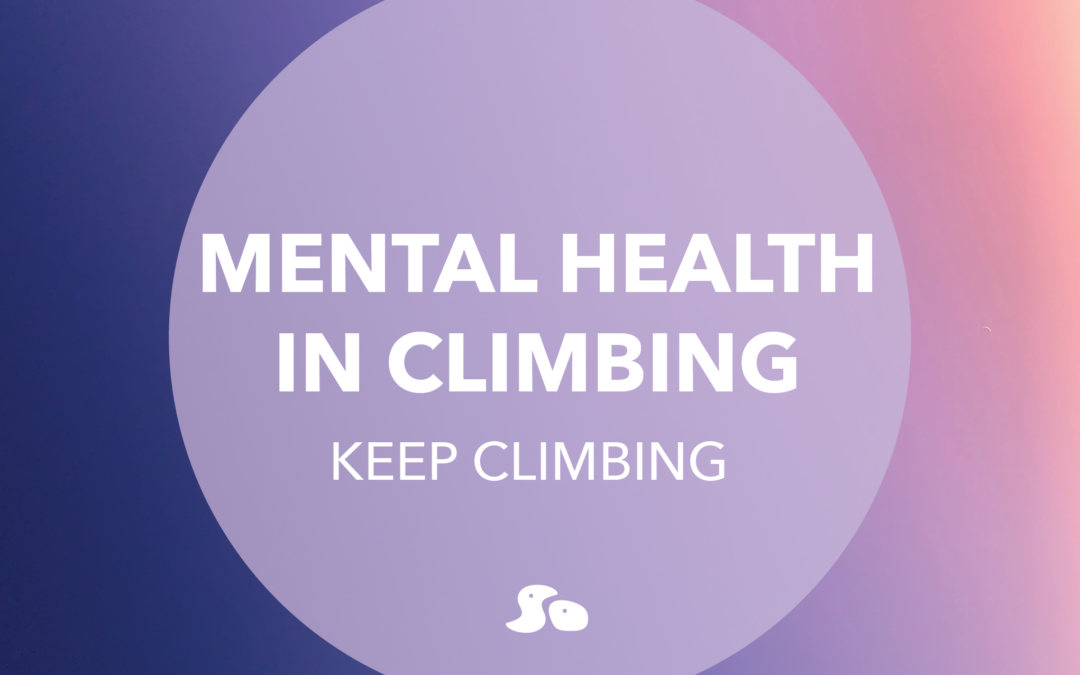Written by Hailey McFelia, Edited by Katherine Ku
In honor of Mental Health Awareness Month we, here at Sender One wanted to start a conversation about mental health in climbing. We all know working out is great for our overall moods and brain chemicals, but there seems to be something different about climbing. Let’s dive in to see what makes this sport so special.

Recent research studies have shown evidence that climbing can improve overall mood and even alleviate depression. A 2021 paper written by Schwarzkopf, Dorscht, Kraus,and Luttenberger suggests that “bouldering-Psychotherapy (BPT) has proven to effectively reduce depressive symptoms,” which is further supported by research showing that climbing nourishes an increased sense of one’s capability.
Bouldering Psychotherapy combines physical activity with psychotherapeutic content and stems from the idea that Cognitive Behavioral Therapy (CBT) can help with depression. Think of cognitive behavioral therapy as positive brain rewiring –now add that with the gains of a physical sport that also works on problem solving. It makes sense that you would see positive results and the ability to reflect on those results.
“Research suggests that climbing is therapeutic. Multiple studies indicate that it can help reduce symptoms of depression, perhaps because it demands focused attention and mindfulness. Some practitioners even use climbing therapy in conjunction with traditional psychotherapy.”
More of this article here
Community is another piece to this amazing activity that can make your brain happy. People do a lot of crazy things to be part of a community – climbers aren’t that crazy though. We just climb till our hands bleed, put our lives in other people’s hands (shout out to our belay partners!), and cheer for a stranger when the try hard is on. We put ourselves out there to help each other reach the top of our projects. Connection with others happens so naturally with rock climbing.

Climbers: Zsana Ramsey, Yuri Ohyabu, Bell Sarian Wong | Photographer: Alex DelVecchio
Personally, it’s what led me to meet so many climbers who have become my emotional support humans. One of them is my “partner in climb,” Raee Lorton. She and I both have our struggles with mental health and she was kind enough to open up and share her story.
“I started climbing in San Francisco when I was going through a hard time in my life. Climbing routes were something I could control. Something I could breathe through. Something I could do on my own without being entirely alone in a gym. When I moved back to LA climbing continued to save me. It gave me discipline and a love for something to get my body moving. Going through a diagnosis for your mental health and starting medicines is incredibly hard. You go through a lot of stress on your body and your mental health expands and collapses in on itself but climbing was something that allowed me to stop and focus on something other than what was going on in my life. I could see myself in a gentle light and see what I was capable of.”

Raee at Stoney Point | Photographer: Jovanna Reyes
The ability to be able to focus on a climb or problem, is a beautiful way to shift your focus. Head game and brain rewiring is an essential part of climbing. When it comes down to it many climbers have to overcome the fear of falling. That alone is a big part of the reflection that comes with rock climbing. We also tell ourselves positive mantras to help us push past our limits and in a way rewire our minds. For example, professional climber and slab lover Anna Hazelnutt tends to chant “I am sticky, I am sticky” (check out her Youtube channel here!) It’s the powerful insight we gain from turning in and reflecting in a positive light.
So why is climbing such an aid for mental health? Maybe it’s the satisfaction of solving a puzzle with your body? Perhaps it’s the personal growth that comes with climbing? For you it might be being part of a group of humans who are probably in the same boat as you? We all have those heavy days. Let’s do what we can to keep climbing, we want you to stick around, and we want to see you send!
If you are looking to become more involved with the rock climbing community consider joining us at one of our meetups or check out our affiliate groups.

